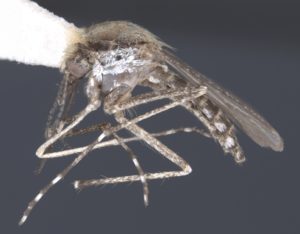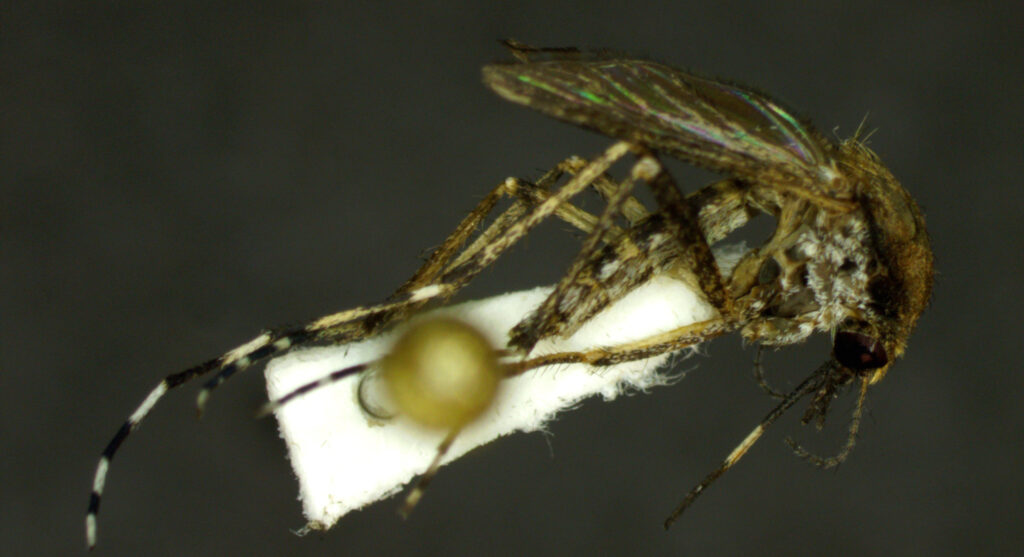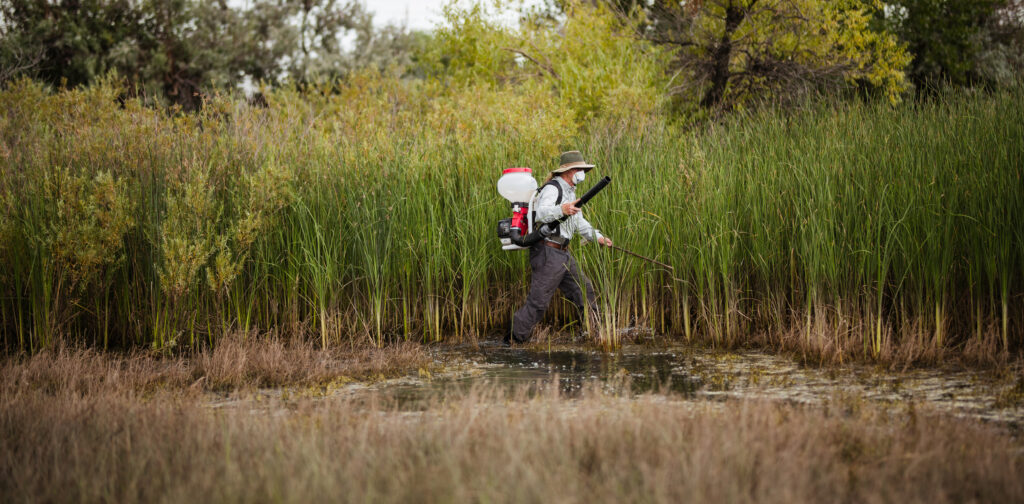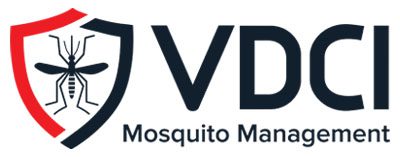Exploring the Aedes sollicitans Mosquito
Mosquitoes carry diseases that can kill people. We know that now. We didn’t always.
Today, many mosquito control programs focus on reducing mosquito abundance because some species can vector life-threatening diseases. However, before making the connection between mosquitoes and disease, it was the nuisance biting that caught everyone’s attention. The Eastern Saltmarsh Mosquito, Aedes sollicitans, was one of the first mosquitoes implicated in creating unbearable living conditions due to their nuisance biting, and one of the first species targeted in large-scale mosquito management programs.
 As its name implies, the Eastern Saltmarsh Mosquito is found primarily along the Atlantic coast from northeastern Canada, south to Florida, and along the Gulf of Mexico to Texas. The larvae tolerate living in the saline wetlands that line the coastal shores, from dense marshes covering many square miles, to shallow pools fed by rainwater and high tides, and they can also be found inland in isolated brackish waters.
As its name implies, the Eastern Saltmarsh Mosquito is found primarily along the Atlantic coast from northeastern Canada, south to Florida, and along the Gulf of Mexico to Texas. The larvae tolerate living in the saline wetlands that line the coastal shores, from dense marshes covering many square miles, to shallow pools fed by rainwater and high tides, and they can also be found inland in isolated brackish waters.
As mosquitoes go, Aedes sollicitans is easily recognizable even to the beginning laboratory surveillance technician. The abdomen is dark-scaled with pale bands on the base of each segment and a pale “racing stripe” of scales down the center. The legs are also dark, marked with broad white bands at the base of each segment and an additional pale band ringing the middle of the first tarsal segment. The primarily black proboscis is also marked by a distinct band of white scales ringing the middle. These contrasting patterns of dark and pale scales give the species a distinct appearance – quite handsome.

Females of this species are aggressive biters, taking blood-meals from many kinds of animals including birds, reptiles, and mammals – especially humans. The species name sollicitans is Latin, meaning “vexing” or “disturbing.” They bite aggressively day or night, and even mosquitoes that are resting in the tall grasses by day will quickly take flight once disturbed and attack anyone walking thru the area. However, the feature that makes this species especially challenging is their extremely long flight distances. From April through October (and often year-round in the southern regions), large, fierce populations of saltmarsh mosquitoes can be found more than 30 miles inland from the nearest coastal swamp, with reports of individuals as far as 100 miles from their likely larval habitats.
 Let’s turn back the clock for a moment to the late 1800’s, when science was only beginning to discover that some mosquitoes vector diseases and their nuisance biting was the main concern. It was also widely believed that mosquito adults never traveled far from the water where they lived as larvae. John B. Smith, former assistant entomologist at the Smithsonian in Washington DC, was hired by Rutgers University to serve as an entomologist at the New Jersey Agricultural Experiment Station in New Brunswick. A young man in his early thirties, Dr. Smith was soon faced with an annual summer infestation of saltmarsh mosquitoes that chased tourists and potential homeowners away from growing coastal resorts. He determined that the adult female mosquitoes biting him at his home likely flew there from as far as 40 miles away. It was immediately clear that any successful control measures would need to be coordinated regionally, focusing on the distant coastal marshes that served as the source of infestations experienced further inland. The early 1900s saw extensive draining of coastal marshlands and larval control using kerosene and other petroleum products to suffocate the surface-breathing larvae. Within just a few seasons, saltmarsh mosquito numbers fell to a tolerable level, allowing summer outdoor activity to be pleasant again.
Let’s turn back the clock for a moment to the late 1800’s, when science was only beginning to discover that some mosquitoes vector diseases and their nuisance biting was the main concern. It was also widely believed that mosquito adults never traveled far from the water where they lived as larvae. John B. Smith, former assistant entomologist at the Smithsonian in Washington DC, was hired by Rutgers University to serve as an entomologist at the New Jersey Agricultural Experiment Station in New Brunswick. A young man in his early thirties, Dr. Smith was soon faced with an annual summer infestation of saltmarsh mosquitoes that chased tourists and potential homeowners away from growing coastal resorts. He determined that the adult female mosquitoes biting him at his home likely flew there from as far as 40 miles away. It was immediately clear that any successful control measures would need to be coordinated regionally, focusing on the distant coastal marshes that served as the source of infestations experienced further inland. The early 1900s saw extensive draining of coastal marshlands and larval control using kerosene and other petroleum products to suffocate the surface-breathing larvae. Within just a few seasons, saltmarsh mosquito numbers fell to a tolerable level, allowing summer outdoor activity to be pleasant again.
Coming back to the 21st century, Aedes sollicitans continues to be a challenging species to control along the Atlantic coast and the Gulf shore. Environmentally, complete marsh draining is generally not the best mosquito control measure due to the high value of coastal wetlands for many forms of wildlife, terrestrial and marine. Instead, open marsh water management techniques utilize ditches to connect shallow mosquito habitats to larger permanent waterbodies, eliminating standing water and giving natural predators such as fish access to mosquito larval habitats. Since the use of surface oils also destroys many non-target organisms, today bacterial larvicides are the pesticide of choice, often applied from the air over the larger, harder to access marsh areas.

We also now realize that the Eastern Saltmarsh Mosquito isn’t just a nuisance species. Aedes sollicitans is a competent vector of Eastern Equine Encephalitis (EEE) and dog heartworm, and both of these diseases are a serious concern throughout the species’ range. Today, the nuisance mosquito responsible for the beginnings of coordinated, large-scale, regional mosquito control programs in the USA is also targeted for its disease potential.
An important component of any successful Integrated Mosquito Management (IMM) program is mosquito identification. Should you have any questions regarding mosquito identification, Vector Disease Control International (VDCI) may be able to help.
Contact Us to Learn More About Effective Mosquito Management Strategies:
 Since 1992, Vector Disease Control International (VDCI) has taken pride in providing municipalities, mosquito abatement districts, industrial sites, planned communities, homeowners associations, and golf courses with the tools they need to run effective mosquito control programs. We are determined to protect the public health of the communities in which we operate. Our mosquito control professionals have over 100 years of combined experience in the field of public health, specifically vector disease control. We strive to provide the most effective and scientifically sound mosquito surveillance and control programs possible based on an Integrated Mosquito Management approach recommended by the American Mosquito Control Association (AMCA) and Centers for Disease Control and Prevention (CDC). VDCI is the only company in the country that can manage all aspects of an integrated mosquito management program, from surveillance to disease testing to aerial application in emergency situations.
Since 1992, Vector Disease Control International (VDCI) has taken pride in providing municipalities, mosquito abatement districts, industrial sites, planned communities, homeowners associations, and golf courses with the tools they need to run effective mosquito control programs. We are determined to protect the public health of the communities in which we operate. Our mosquito control professionals have over 100 years of combined experience in the field of public health, specifically vector disease control. We strive to provide the most effective and scientifically sound mosquito surveillance and control programs possible based on an Integrated Mosquito Management approach recommended by the American Mosquito Control Association (AMCA) and Centers for Disease Control and Prevention (CDC). VDCI is the only company in the country that can manage all aspects of an integrated mosquito management program, from surveillance to disease testing to aerial application in emergency situations.

